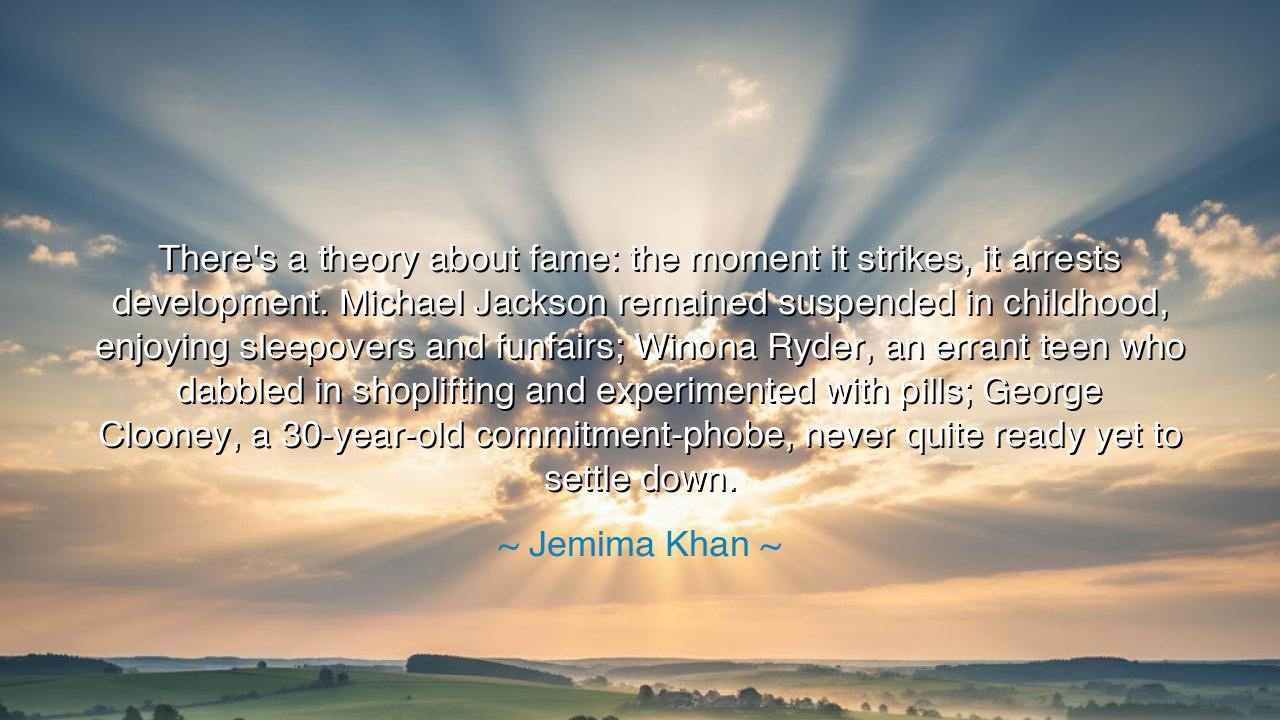
There's a theory about fame: the moment it strikes, it arrests
There's a theory about fame: the moment it strikes, it arrests development. Michael Jackson remained suspended in childhood, enjoying sleepovers and funfairs; Winona Ryder, an errant teen who dabbled in shoplifting and experimented with pills; George Clooney, a 30-year-old commitment-phobe, never quite ready yet to settle down.






Hear the striking words of Jemima Khan, who observed with piercing insight: “There’s a theory about fame: the moment it strikes, it arrests development. Michael Jackson remained suspended in childhood, enjoying sleepovers and funfairs; Winona Ryder, an errant teen who dabbled in shoplifting and experimented with pills; George Clooney, a 30-year-old commitment-phobe, never quite ready yet to settle down.” Though her words are framed with examples of celebrities, the truth she speaks is far older and broader: that sudden glory, when it comes too soon or too strongly, can halt the natural growth of the soul, leaving men and women frozen in the age at which fame first claimed them.
The meaning of this reflection lies in the nature of development itself. Life was meant to unfold in seasons: childhood ripening into youth, youth into adulthood, adulthood into wisdom. Each stage brings trials that shape character and experiences that temper the heart. But fame, with its intoxicating lights and endless attention, interrupts this sacred journey. It offers immediate gratification, constant adoration, and a distorted mirror of self. For some, it becomes a gilded cage, where they continue to live out the role of the age at which fame first struck, unable to step beyond it.
The stories Khan invokes are powerful illustrations. Michael Jackson, crowned the "King of Pop" while still a child, never fully tasted an ordinary adulthood. His life became a reflection of the boy he once was, filled with sleepovers, amusement parks, and the pursuit of innocence lost. Winona Ryder, a starlet of youth, stumbled through rebellion, as though she had been denied the quiet, private mistakes every teen is meant to make. And George Clooney, though later celebrated for maturity and charm, for years played the role of the hesitant youth, delaying responsibility, unwilling to anchor himself in the duties of adulthood. Each, in their own way, shows how fame can bind a person to a single chapter of life, leaving the pages beyond unwritten.
History too confirms this truth. Consider Alexander the Great, who at a young age conquered vast empires and became a legend before reaching thirty. His glory was unmatched, yet his development as a man of peace, reflection, and governance was cut short. His identity remained that of the youthful conqueror, restless and insatiable, never maturing into the wisdom of the elder statesman. He died at thirty-two, frozen forever in that role. So too have many men and women of sudden renown failed to grow beyond the moment that fame seized them.
The danger of fame is thus not only external but internal. It reshapes the self into an image adored by others, and in the prison of that image, growth falters. The ordinary struggles that forge maturity—failure in obscurity, quiet self-reflection, relationships unobserved by the world—are denied to the famous. And without those trials, the soul may remain fragile, caught forever in the role it once played, unable to move forward.
The lesson for us is clear: do not envy those who seem to shine with sudden brightness, for their burden is heavy. Do not despise your own slow and quiet growth, for it is the soil of true maturity. Life’s value is not in how quickly recognition comes, but in how fully one becomes whole, stage by stage. The wisdom of obscurity is that it allows mistakes to be made in private, growth to be nurtured unseen, and maturity to take root before the glare of the world intrudes.
Therefore, let us act with patience and humility. Let us seek not the shortcut of sudden fame, but the steady path of growth, learning, and self-discovery. And if fame should come, let us guard ourselves with wisdom, remembering that attention is not the same as love, and applause is not the same as understanding. For as Jemima Khan reminds us, fame arrests development unless the soul remains vigilant—and the true triumph of life is not to be frozen at any one age, but to grow, to ripen, and to pass through every season of humanity with grace.






AAdministratorAdministrator
Welcome, honored guests. Please leave a comment, we will respond soon